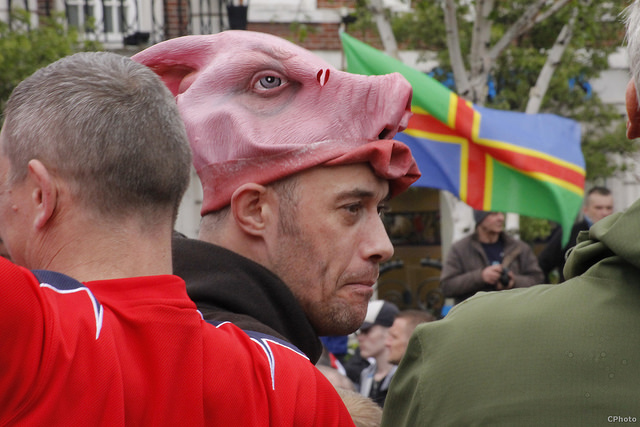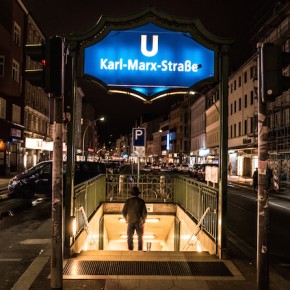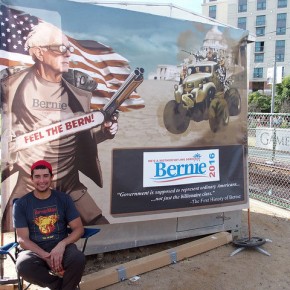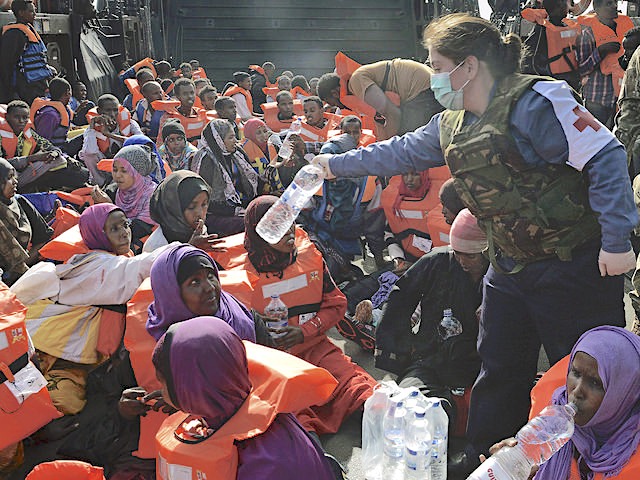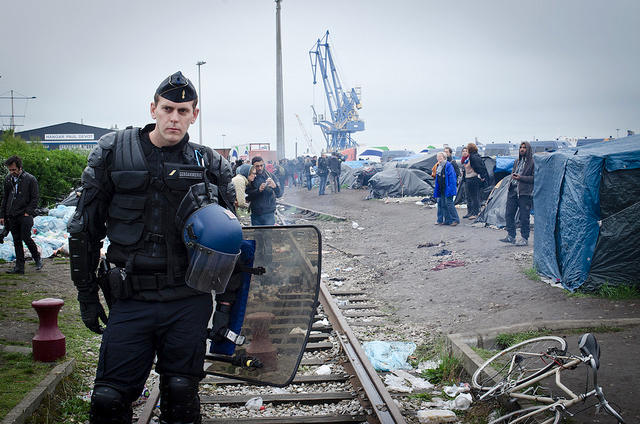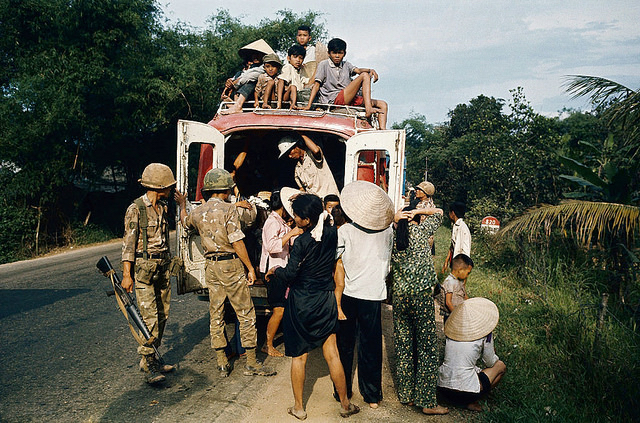On January 30th, we joined anti-fascist demonstrators in confronting far-right groups, including the National Front, the Southeast Alliance, Combat 18, and the Scottish Defence League, as they marched in Dover. We ended up being confronted by brutal violence, that was easy to rationalize, in the context of the British government’s incitement against migrants and refugees, and its fiscal policies.
We left London just before ten o’clock, and were seated in the front of our coach as we pulled into a rest stop. We could see a large group of neo-Nazis fighting with anti-fascist activists through the window. Smoke bombs and rubbish bins were flying through the air. As we briefly left our the bus, someone threw a bottle at Bilal, as though they were violently reacting to the sight of his brown skin.
Dan was on the phone with a friend of ours as her coach was being directly attacked. She said that she was lying in the aisle, as glass rained down on her from smashed windows. Neo-Nazis threw chairs at the bus, and seemed to be painting Swastikas in their own blood, on the pavement, below. It could have actually been paint, in retrospect, but it was still shocking. The message being conveyed was clear.
Organisers later speculated that the men could have followed our coaches from London. Three out of five coaches never made it to Dover because of the fighting, suggesting that inadequate consideration had been given to the possibility that we might be stopped en route to the demonstration, not by police, but by the extremists we sought to block. We shouldn’t have been caught off guard, and were wrong to assume that the worst treatment would come from police.
.
Just before arriving in Dover, the bus was pulled over by police in Maidenhead, who questioned its passengers and searched for weapons. Bilal was physically restrained, while being searched for a bladed weapon. His being singled out, as an Asian, was clear, especially since there were white passengers who weren’t searched at all. Bilal felt as though inadequate consideration was given by the activists present to the fact that certain passengers would need more assistance in dealing with police.
Finally, we arrived in Dover, and we got separated from the group when Dan’s partner needed to use the bathroom. As we waited for him, we could see that a line of Combat 18 thugs were walking on the other side of the street. Violent militants, Combat 18 was considered the most radical neo-Nazi organization in the UK during its first decade of existence, in the 1990s. Organisers also did not adequately prepare for them being at the demonstration, and what would happen if they caught any of us alone beyond a “buddy system” that we followed while getting attacked.

One man was smoking a cigarette, and flipped off someone who shouted “Nazi.” He was carrying a Union Jack tied to a wooden plank. We both organise for Never Again Ever! and noted that the European far-right is able to mobilise in part because countries like Britain refuse to come to terms with its imperial past. Yet at the same time, it is clearly still alive, as evinced by its attachment to the Jack. The neo-Nazis waved it proudly, turning it into a vehicle for promoting fascist politics.
Dan’s partner left the bathroom. The three of us began watching the neo-Nazis march from afar, seeing National Front banners, and hearing extremist slogans rip through the air. Dan later stated that it was shocking to see just how confident the far-right have become. As we walked down a side street, in order to join the demonstration, we ran into someone with blood streaming down his face. After deciding to get him medical attention, we spotted a group of men wearing black balaclavas.
One of them screamed out, “anti-fash!” and most of us sprinted in reverse, only stopping when we found emergency workers attending to two men on the sidewalk. Suddenly, Bilal and Dan’s partner noticed that Dan wasn’t there, and ran back to find him. Bilal was told to hang back slightly. Dan stumbled down the street with a bruise under his right eye, and blood coming out of his nose and mouth. He had suffered a concussion, and repeatedly asked confused questions for nearly forty minutes.
As we waited for news about getting back to London, we saw blood running down an injured photojournalist’s arm, soaking into his torn shirt. Bilal said, “It was the most blood I’ve ever seen at a protest in Britain,” before noting that activists should have come with their own supplies, including bandages and antiseptic. It seems particularly obvious after knowing that Combat 18 was there.
As the dispirited group returned home, Dan began putting the violence into context. We discussed how the violence was a direct result of the policies of many European states, including the United Kingdom. Fascists came out in surprising numbers because migrants have been repeatedly scapegoated as a destabilizing presence during a period of prolonged economic decline.
Both of us have talked to people who were surprised at what happened on Saturday. They shouldn’t be, given the viciousness of the tabloid press, the pressure of austerity under the Tories, and widespread uncertainty about the future of the European Union.
Another million refugees are expected to enter the EU this year. The response will undoubtedly be reactionary, particularly after the events in Cologne. Dover may be an indication of the future, both in the far-right mobilisation, and in the need for an anti-fascist response. We are preparing ourselves for it, and urge our fellow activists to do the same. The first step is learning from the Dover demo’s mistakes.
Photographs courtesy of Chris. Published under a Creative Commons License.
